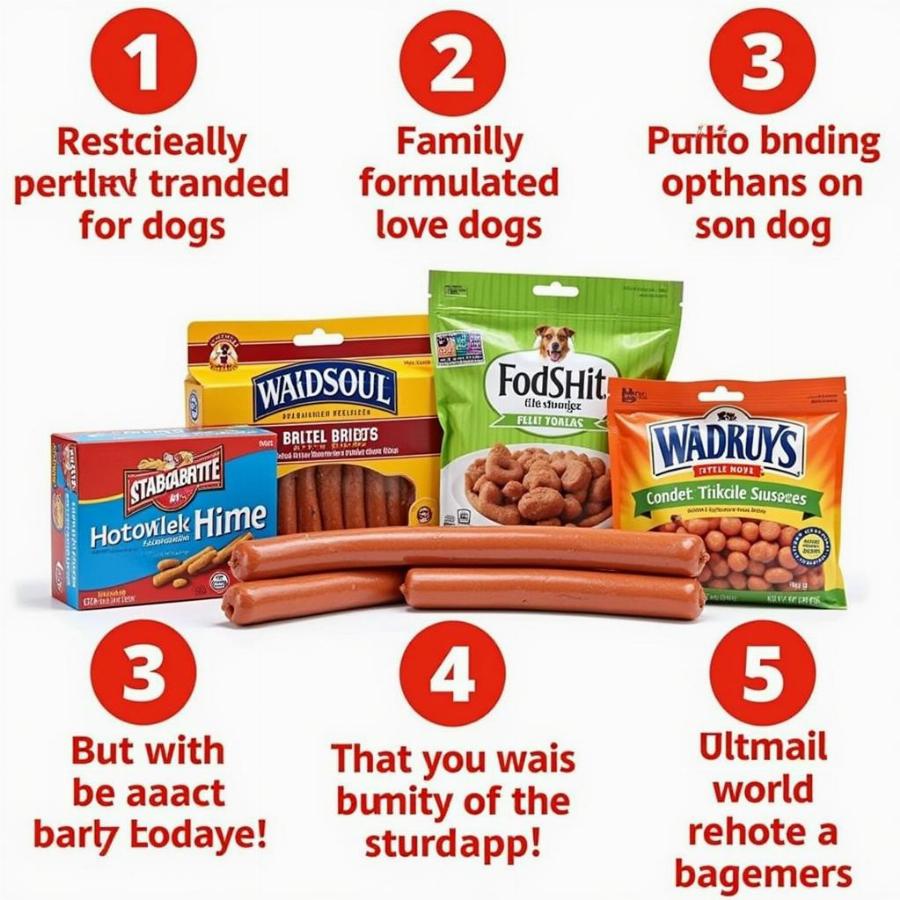Hot dog brand preferences for dogs? It’s a surprisingly complex topic. While we might be tempted to offer our furry friends a bite of our own franks, it’s crucial to remember that their dietary needs are different from ours. This article explores the ins and outs of choosing safe and healthy treats for your dog, focusing on what you need to know about hot dogs and their suitability for canine consumption.
Decoding “Hot Dog Brand Preferences” for Dogs
The search term “hot dog brand preferences” suggests an interest in what kinds of hot dogs are best for dogs. However, it’s essential to understand that regular hot dogs designed for human consumption are generally not recommended for dogs. They often contain high levels of sodium, fat, and preservatives, as well as seasonings like garlic and onion powder, which can be toxic to canines.
So, what’s a dog owner to do? This article delves into healthier alternatives to traditional hot dogs and helps you navigate the world of dog treats. We’ll discuss why certain ingredients should be avoided and offer suggestions for treats that satisfy your dog’s cravings while prioritizing their health.
 Choosing the Right Hot Dog Brand for Your Dog
Choosing the Right Hot Dog Brand for Your Dog
Are All Hot Dogs Off-Limits for Dogs?
Not all hot dogs are created equal. While standard hot dogs are a no-go, some brands specifically formulate treats that resemble hot dogs but are made with dog-friendly ingredients. These treats are typically lower in sodium and fat, and they avoid harmful additives. However, even these should be offered in moderation.
It’s important to read the ingredient list carefully. Look for treats made with real meat and avoid those with artificial colors, flavors, and preservatives.
Healthy Alternatives to Hot Dogs for Dogs
There’s a wide array of delicious and nutritious treats available that are much healthier than hot dogs. These include:
- Single-ingredient chews: These are made from dried meat like beef, chicken, or turkey, providing a protein-rich snack.
- Freeze-dried treats: These retain the nutritional value of fresh ingredients while offering a satisfying chew.
- Fruits and vegetables: Certain fruits and vegetables, like carrots, apples (without seeds or core), and blueberries, can make healthy and refreshing treats. Always introduce new foods gradually.
- Dog-specific jerky: Opt for jerky made specifically for dogs, as human jerky often contains high levels of sodium and spices.
What if My Dog Snatches a Hot Dog?
If your dog accidentally grabs a bite of your hot dog, don’t panic. A small amount is unlikely to cause serious harm, especially for larger dogs. However, monitor them for any signs of gastrointestinal upset like vomiting or diarrhea. If they exhibit any concerning symptoms, contact your veterinarian.
Choosing the Best Treats for Your Canine Companion
Selecting the right treats for your dog is crucial for their overall health and well-being. Consider factors like your dog’s size, age, allergies, and dietary needs.
“Always prioritize treats that are made with high-quality ingredients and avoid those containing artificial additives and fillers,” advises Dr. Sarah Miller, DVM.
Conclusion
While the term “hot dog brand preferences” might lead some to believe that certain hot dog brands are ideal for dogs, the reality is that conventional hot dogs are best avoided. Thankfully, numerous healthy and delicious alternatives exist to satisfy your dog’s cravings and keep them happy and healthy. By carefully choosing treats made with wholesome ingredients, you can ensure your furry friend enjoys a long, healthy, and treat-filled life. Remember to always consult with your veterinarian if you have any concerns about your dog’s diet.
FAQ
- Can dogs eat hot dog buns? (No, they can be difficult to digest and may contain harmful ingredients.)
- What are the signs of a dog food allergy? (Itching, skin irritation, vomiting, diarrhea.)
- How many treats should I give my dog per day? (Treats should make up no more than 10% of their daily caloric intake.)
- Are homemade dog treats a good option? (Yes, provided you use safe and healthy ingredients.)
- What should I do if my dog eats something toxic? (Contact your veterinarian immediately.)
- Can puppies eat the same treats as adult dogs? (No, puppies have different dietary needs. Choose treats specifically formulated for puppies.)
- How can I find out if a certain ingredient is safe for my dog? (Consult your veterinarian or a reliable online resource.)
Beaut Dogs is your one-stop shop for all things dog-related, providing reliable and insightful information about the canine world. From breed guides to health tips, we’re here to help you provide the best possible care for your furry friend. When you need expert guidance, contact us at [email protected]. We at Beaut Dogs are here to answer your questions accurately and in detail.